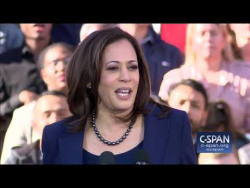
Another reason is that American politics are based on economic cycles, and the economic future hates him.
America runs by the Golden Rule. He who has the gold makes the rules. The business of America is business, and the business with the highest value-add calls the tune.
Back in 1979 this was the oil industry. Jimmy Carter defied oil with a cardigan sweater and a call for conservation. They buried him.

All Trump’s policies are aimed, in the end, at benefiting oil and at hurting the technology industries. Ending renewable subsidies, while subsidizing pipelines and oil drilling, are just the most obvious examples. Halting immigration, especially of tech workers under H1-B visas and students operating under student visas, hurts tech.
In 1979, when I was starting my career, it was clear that oil was in the Republican camp. As 2019 opens it is not clear that technology is in the Democratic camp, but it is.

Trump’s use of Twitter, and his use of Russian trolls, wasn’t done in connivance with Google or any other tech company. It was done in defiance of the industry. But when Democrats throw up people like Elizabeth Warren, Bernie Sanders and Alexandria Ocasio-Cortez, who wear their disgust with companies such as Google on their sleeves, it’s easier to see tech getting behind someone like Howard Schultz.
That boomlet is going to dissipate faster than the Beto O’Rourke one did. Most voters hate Trump, hate him with a passion. The only way for technology to gain power is to get on the right side of the political future.

Oil had to eat some crow before getting behind Reagan. Tech will have to eat some crow, too. This year will be crow-eating time. But tech’s influence can’t be denied. Democrats will have to compromise as well.
Google is now the largest lobby in Washington, and the other “Cloud Czars” – Apple, Microsoft, Facebook and Amazon – aren’t far behind them. Most seem to recognize that the industry has become too centralized in Silicon Valley, but they remain wedded to centralization. All five have big offices in Atlanta, for instance. But Amazon decided, after much internal debate, to decentralize with offices in Washington and New York rather than going anywhere in “flyover country.”

I want Howard Schultz. I’ll take Michael Bloomberg. I’ll get Kamala Harris.
Kamala Harris represents California, which is the heart of Techlandia. She appeals to Democrats in part because can deliver a speech and stare down a witness. Her campaign slogan, “for the people,” emphasizes her experience as a prosecutor, and there’s a crime wave going on in the nation’s executive suites. Her views are conventional, but her mother is Indian, her father Jamaican, and her husband is a white dude. Those are the kinds of demographics Democrats want to shove down Republicans’ throat in 2020. They’re willing to pay a price in policy to get revenge for what happened to Hillary Clinton.
Harris can also make a deal. She won’t break up Google, although she may regulate it, which is not that bad. The costs of regulation would cement the Cloud Czars’ positions on top of the business world, for a generation, until some other industry comes to take over. (One word on that: biology.)

There are back-up plans if Kamala Harris falters. Kristin Gillibrand is one. Amy Klobuchar may be another. Industries like Wall Street and entertainment will weigh in over the next several months. The Great Whisperer will do his (and her) magic. We’ll see what happens.
Let the Google primary begin.










